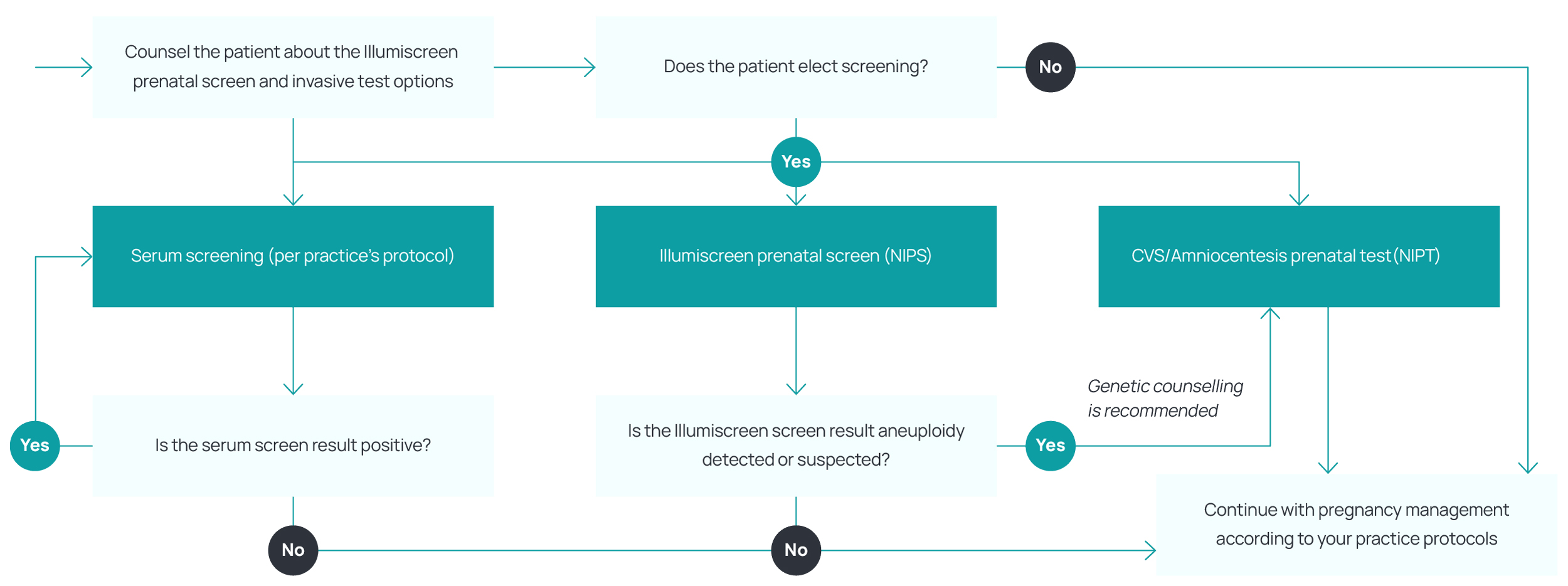The following workflow shows where Illumiscreen sits in the patient management pathway.

Reading the report
As a healthcare provider, you will receive your patient’s results which you will then need to discuss directly with them. You will also need to discuss further screening or diagnostic testing options where appropriate, or arrange for appropriate referral.
It is recommended that irreversible clinical decisions should not be made based on these screening results alone. If a definitive diagnosis is desired, chorionic villus sampling (CVS) or amniocentesis should be considered. See Patient Management for more.
The Illumiscreen NIPS result will indicate whether there is an increased chance the fetus will have a chromosomal condition through the detection of a chromosomal aneuploidy.
The report provided will include one of three possible results for chromosomes:
- No Aneuploidy Detected – The expected number of chromosomes were found. The result indicates a low-chance for the presence of a chromosomal condition.
- Aneuploidy Detected – An extra or missing copy of a chromosome has been identified. This result can indicate an increased chance for a chromosomal conditions. For confirmation, a diagnostic test is advised. Genetic counselling is recommended.
- Aneuploidy Suspected – This is a borderline result, which occurs infrequently and suggests there might be an extra copy of a chromosome present. For confirmation, a diagnostic test is advised. Genetic counselling is recommended.
‘Negative’ results
Sex chromosomes will be reported as either No Aneuploidy Detected or Aneuploidy Detected. For single pregnancies it will also show the sex of the fetus as male (XY) or female (XX).
If the Illumiscreen NIPS result shows No Aneuploidy Detected, it indicates a low-chance result, it does not completely rule out all potential issues with the fetus’ chromosomes.
Although Illumiscreen is a highly reliable, non-invasive and advanced screening tool, no test can guarantee 100% that a fetus will not have any other medical condition or physical malformation.
‘Positive’ results
It is important to note that Illumiscreen NIPS is a screen, not a diagnostic test. If the Illumiscreen result shows Suspected Aneuploidy Detected or Aneuploidy Detected, it indicates a high-chance result that there might be a chromosomal condition present. The screening results need to be confirmed with diagnostic testing.
NIPS results should not be used as the sole basis for pregnancy management decisions.
If your patient receives a ‘positive’ Illumiscreen NIPS result and you do not feel comfortable discussing the result, please refer them to a healthcare professional with appropriate expertise to discuss the reported chromosome aneuploidies, what further testing and evaluations are appropriate, and any potential clinical implications.
Testing options can include (but are not limited to):
- Detailed ultrasound evaluation to confirm fetal viability, identify possible structural anomalies in the fetus, and/or to determine if the pregnancy is at risk for complications such as intrauterine growth restriction
- Diagnostic testing via chorionic villus sampling or amniocentesis to determine if the positive NIPS result is indicative of a true fetal chromosomal condition, fetal mosaicism, fetal uniparental disomy, or placental mosaicism
- Additional specialised testing e.g. karyotyping or microarray (in specific cases)
